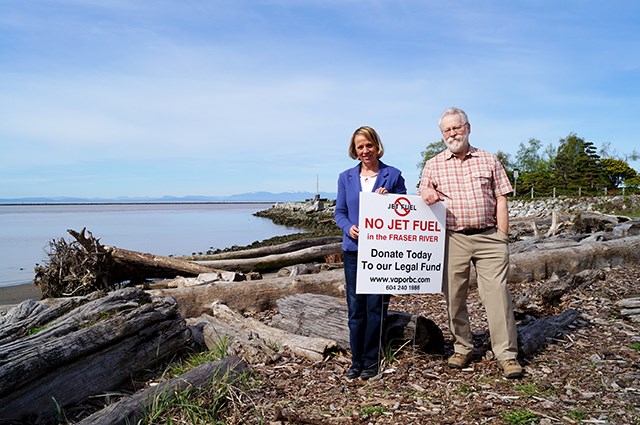As a proposed twinning of Kinder Morgan’s Trans Mountain pipeline in Burnaby garners all the headlines from large Metro Vancouver media outlets, a quieter, but arguably equally significant, pipeline proposal will be challenged in court today (Wednesday), with last-minute support from the City of Richmond.
Richmond’s grassroots environmental group VAPOR is challenging the public consultation process, overseen by the British Columbia Environmental Assessment Office, of a planned marine jet fuel facility on the Fraser River and pipeline spanning across the city to the airport.
It believes an environmental certificate ought not to have been granted.
“The governments have so cut environmental assessment laws and habitat protection laws to fast track such developments that the public now has to resort to the courts as a way of protecting our public interest and our natural legacy found in beautiful B.C.,” said VAPOR chair Otto Langer in an email to the News.
VAPOR has received support from the environmental group, David Suzuki Foundation, as well as the social justice organization, the Council of Canadians, among others.
On Monday Richmond City Council reaffirmed its support for VAPOR and opposition to the jet fuel facility with a letter of support and by granting it $2,500 to help the society’s court case, which has cost $50,000 to date, according to Langer.
“We feel this support for our action shows the broad base of support we have in the community that shares our view that jet fuel tankers and barges simply have no place in the Fraser River,” said Langer, a retired marine biologist.
The Suzuki Foundation noted in a letter to the B.C. government that the project lacked adequate scientific research and the subsequent approval “does not adequately address public opposition to the project.”
A flawed public consultation process is all that VAPOR is clinging to in its application for a judicial review scheduled for today and tomorrow in BC Supreme Court.
“The only downside is that we are challenging the (environmental assessment) process and not the technical merits of the project which are next to nil when you consider other options (such as land-based routes),” said Langer, who notes VAPOR is not opposed to increasing fuel supplies to the airport.
Opponents such as Langer claim the facility’s proponent, the Vancouver Airport Fuel Facilities Corporation, only put forth one suggestion to get more fuel to Vancouver’s growing airport, thus the process was further flawed.
VAFFC claims delivering jet fuel up the river makes more sense than twinning an existing pipeline through Burnaby or trucking more fuel from Washington state (or building a pipeline). It also claims overseas fuel can be more cost effective for airlines.
VAPOR contests in its court submissions that “the public was denied the meaningful participation mandated by the EAA.”
Throughout the now four-year saga, which saw numerous delays, VAPOR contests the public was not able to adequately respond to some information submitted from VAFFC.
At times websites didn’t work, information was posted beyond what is prescribed by law, public notices were flawed, comments at open houses were not recorded and some information wasn’t open to comment, claims VAPOR.
VAPOR notes at one point, following VAFFC’s application, even the City of Richmond had a tough time assessing the project in a timely manner.
According to a letter from the city at the time, staff were “hard pressed” to review the entire application in a “meaningful way” during the 45-day time frame given by EAO. Afterwards, public comments were extended 15 more days, but VAPOR claims even that extension was still inadequate, considering the magnitude of the project.
Lawyers for the provincial government responded to the claims, stating there were more open houses than were required and time granted for public comments was also more than what is set by law.
Approximately 700 people attended the various open house and information sessions and the EAO public comment process solicited approximately 565 comments, which were factored into the decision to grant an environmental certificate, according to the province.
“Collectively, the petitioners’ affidavits are replete with opinion evidence, hearsay evidence, and information that was not before the EAO at any time leading up to the decisions at issue in this proceeding,” added the province in its submitted response to VAPOR.
Langer said had the province done a better job of informing and engaging the public it could have saved legal costs for taxpayers.
The Suzuki Foundation noted it has concerns about the granting of a certificate as attempts to formalize federal-provincial environmental project review harmonization was underway.
Should VAPOR be successful — something Richmond’s mayor Malcolm Brodie thinks it won’t be — VAFFC would need to reapply for an environmental certificate and, presumably, perform a more robust public consultation process.



